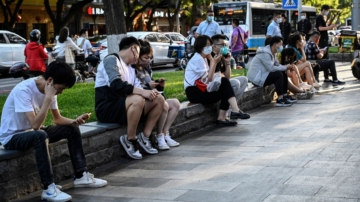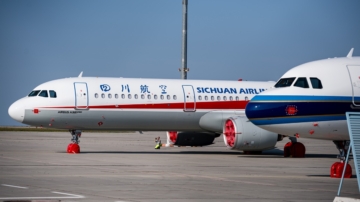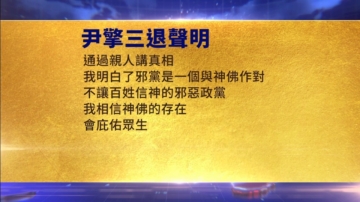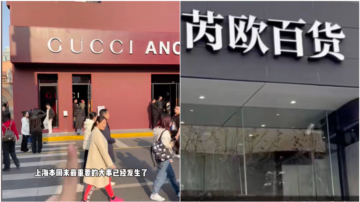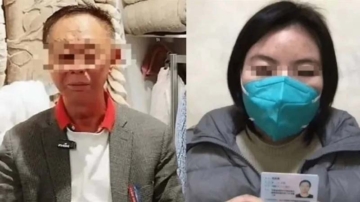【新唐人2011年11月7日讯】国际人权组织“人权观察”发表一份调查报告,严厉指责在赞比亚投资的中国矿业公司无视工人权益,严重违反当地劳工法。但中共外交部发言人洪磊在例行记者会上否认这项指控。有学者指出,中共官员颠倒黑白,新闻发言没有经过调查,极不负责任。
“人权观察”这份超过100页的报告书,是“人权观察”在去年﹙2010年﹚11月到今年﹙2011年﹚7月期间,对四家中国公司进行三次调查的结果。而这四家中国公司,都是中国的国有企业“中国有色矿业集团”下属的子公司。
报告披露,在这些由中国公司经营的矿场里,矿工每天超时工作,有时工作时间长达18小时,而且公司对矿井下的安全规章不闻不问。矿道中换气量严重不足导致烟尘迷漫,让矿工很容易得上肺病,而且损坏的安全设备不予更换,那些拒绝去危险作业面工作的矿工则经常被威胁炒鱿鱼。
深圳当代社会观察研究所所长刘开明:“中国企业的习惯仍然是,可能把在中国国内的习惯带过去。他们习惯就是跟政府搞好关系,跟政府搞好关系就可以了,而不管工人的情况,也不管社区的这种意见。”
调查报告引述受访的赞比亚矿工的话,矿工说:中国老板只想着产量,要求矿工365天,天天工作,对安全根本不关心。如果有工伤死亡,空缺第二天就会被人顶替。他们还采用收买或威胁的方式,防止矿工向政府上报事故或其他问题。另外,参加工会活动的矿工受到威胁:“可能会被开除”。
权利运动负责人胡军:“中共现在在把它的一些掠夺的理念,对社会破坏的一些方式方法向国外进行扩散。这个我觉得国际社会应该更多的来注意到这件事情。”
“人权观察”负责人贝克莱还指出:调查发现中国公司经营的赞比亚铜矿中,很多在健康和安全方面无视工人权益的做法,与“人权观察”在中国国内看到的很多违反劳工法的情况非常相似。
但中共外交部发言人洪磊在例行记者会上却极力辩驳。
胡军:“中国的官员和新闻发言人都是喜欢颠倒黑白,这是一贯的事情,他们的说话你要反着来看。如果说他连自己的国民都不去尊重,更何况是非洲国家。他连自己的国民都去迫害,都去残忍的屠杀的话,那对其他地区的人那就可想而知了。”
刘开明也认为,洪磊这样的发言没有说服力,因为他违背了没有调查就没有发言权的基本原则。
刘开明:“我想洪磊先生并没有到过这个企业,也没有跟企业的这些工人和工会来交流。那他怎么知道这个矿厂并没有违反当地的法律,并没有侵害工人的利益呢?显然我觉得这样的回应是不负责任的。”
近年来中共大幅投资赞比亚,但是由于中国公司经营的企业工作条件差,工资待遇低,并没有受到赞比亚平民的欢迎。因工资等问题导致的劳资冲突时有发生。最严重的一次是去年十月,在中共投资的铜矿工作的11名赞比亚工人,因要求改善工资待遇和工作条件,而遭到中共管理人员的枪击。
铜矿资源开发是赞比亚的经济支柱。赞比亚新任总统萨塔在今年九月竞选期间,曾严厉批评中共投资的经营方式,并且说,中国企业经营的铜矿发给当地工人的是“奴隶级别的工资”。
这次“人权观察”组织在报告中也敦促萨塔兑现他的竞选诺言,采取果断行动整治中资公司。
新唐人记者秦雪、李明飞、王明宇采访报导。
Report: Zambia’s Chinese-Run Mines Violate Labor Laws
International human rights organization
"Human Rights Watch" issued a report that
severely criticized the Chinese invested mining companies
in Zambia, saying they ignore workers’ rights and seriously violate local labor laws.
The Chinese Foreign Affairs spokesperson Hong Lei denied
the allegations at a press conference.
Scholars indicated that the Chinese official was lying and
his statement, without an investigation, was very irresponsible.
The report by "Human Rights Watch" runs over 100 pages.
It detailed the results of three research missions
to Zambia’s four Chinese copper operations in November 2010 and July 2011.
These four Chinese companies in Zambia are subsidiaries of
China Non-Ferrous Metals Mining Corporation,
a state-owned enterprise under the authority of
China’s highest executive body.
The report reveals that workers in these Chinese-run mines
work overtime every day,
sometimes up to 18 hours working time, and mine safety and
regulations are subject to companies’ indifference.
For instance, inadequate ventilation results in hazy smoke
in the mines that can lead to serious lung diseases,
failing to replace workers’ damaged protective equipment,
and routinely threatening to fire workers who refuse to work in unsafe places.
Director of the Institute of Contemporary Observation in Shenzhen, Dr. Liu Kaiming: "It’s the habit of the Chinese enterprises.
They might have continued their habit in China.
Their habit was to create good relations with the government.
It is enough to maintain a good relationship
with the government.
They don’t care about the situation of the workers,
or the opinion of the community. "
The report cited underground miners’ words,
“They just consider production, not safety.
If someone dies, he can be replaced tomorrow,”
“At times, Chinese managers bribe or threaten miners
to keep them from reporting accidents or other problems
to the government’s Mines Safety Department,”
and union representatives are threatened to be fired.
The head of Human Rights Campaign in China, Mr. Hu Jun:
“Communist China is now spreading its (predatory) concept
a number of ways via social disruption, overseas.
I think the international community should be more aware of
this situation.”
Africa Director at Human Rights Watch, Mr. Bekele,
also pointed out: “Many of the poor health and safety practices
we found in Zambia’s Chinese-run mines look strikingly
similar to abuses we see in China.”
But Chinese Foreign Ministry spokesman Hong Lei
has refuted these claims at a press conference.
Hu Jun: "Chinese officials and the press spokesman are
in favor of reversing right and wrong, which is a consistent behavior.
Whatever they say you should look at it the other way.
If he does not even respect his own people,
let alone countries in Africa, he even persecutes their citizens, slaughters them cruelly,
then you can imagine what this official would do to people
in other areas. "
Liu Kaiming does not believe that Hong Lei’s statement
is convincing, because he violated the rule of speaking rights.
He did not have the right to speak
since he did not investigate the claim.
Liu Kaiming: "I don’t think Mr. Hong Lei has ever been
to this business, or has any exchange with these workers or unions.
How would he know if these mines did not violate local law,
or endanger miners’ interest? Obviously I think his reply was irresponsible. "
China has quite a substantial investment in Zambia
in recent years,
but because of poor working conditions and low wages,
they have not been welcomed in Zambia.
Labor conflicts over wages occur quite often.
The most serious one was in October of last year.
13 Zambian copper workers were shot by Chinese managers
over a demand to improve wages and working conditions.
Copper is Zambia's main economic resource.
Zambia's new president Sata severely criticized
the Chinese investment operations during the election ampaign in September this year
and referred to the wages that Chinese companies pay
local workers as "slave wages."
In the report, "Human Rights Watch" also urged Sata to act
on his campaign promise to crack down on illegal Chinese labor practices.
NTD reporters Qin Xue,Liming Fei and Wang Mingyu
“人权观察”这份超过100页的报告书,是“人权观察”在去年﹙2010年﹚11月到今年﹙2011年﹚7月期间,对四家中国公司进行三次调查的结果。而这四家中国公司,都是中国的国有企业“中国有色矿业集团”下属的子公司。
报告披露,在这些由中国公司经营的矿场里,矿工每天超时工作,有时工作时间长达18小时,而且公司对矿井下的安全规章不闻不问。矿道中换气量严重不足导致烟尘迷漫,让矿工很容易得上肺病,而且损坏的安全设备不予更换,那些拒绝去危险作业面工作的矿工则经常被威胁炒鱿鱼。
深圳当代社会观察研究所所长刘开明:“中国企业的习惯仍然是,可能把在中国国内的习惯带过去。他们习惯就是跟政府搞好关系,跟政府搞好关系就可以了,而不管工人的情况,也不管社区的这种意见。”
调查报告引述受访的赞比亚矿工的话,矿工说:中国老板只想着产量,要求矿工365天,天天工作,对安全根本不关心。如果有工伤死亡,空缺第二天就会被人顶替。他们还采用收买或威胁的方式,防止矿工向政府上报事故或其他问题。另外,参加工会活动的矿工受到威胁:“可能会被开除”。
权利运动负责人胡军:“中共现在在把它的一些掠夺的理念,对社会破坏的一些方式方法向国外进行扩散。这个我觉得国际社会应该更多的来注意到这件事情。”
“人权观察”负责人贝克莱还指出:调查发现中国公司经营的赞比亚铜矿中,很多在健康和安全方面无视工人权益的做法,与“人权观察”在中国国内看到的很多违反劳工法的情况非常相似。
但中共外交部发言人洪磊在例行记者会上却极力辩驳。
胡军:“中国的官员和新闻发言人都是喜欢颠倒黑白,这是一贯的事情,他们的说话你要反着来看。如果说他连自己的国民都不去尊重,更何况是非洲国家。他连自己的国民都去迫害,都去残忍的屠杀的话,那对其他地区的人那就可想而知了。”
刘开明也认为,洪磊这样的发言没有说服力,因为他违背了没有调查就没有发言权的基本原则。
刘开明:“我想洪磊先生并没有到过这个企业,也没有跟企业的这些工人和工会来交流。那他怎么知道这个矿厂并没有违反当地的法律,并没有侵害工人的利益呢?显然我觉得这样的回应是不负责任的。”
近年来中共大幅投资赞比亚,但是由于中国公司经营的企业工作条件差,工资待遇低,并没有受到赞比亚平民的欢迎。因工资等问题导致的劳资冲突时有发生。最严重的一次是去年十月,在中共投资的铜矿工作的11名赞比亚工人,因要求改善工资待遇和工作条件,而遭到中共管理人员的枪击。
铜矿资源开发是赞比亚的经济支柱。赞比亚新任总统萨塔在今年九月竞选期间,曾严厉批评中共投资的经营方式,并且说,中国企业经营的铜矿发给当地工人的是“奴隶级别的工资”。
这次“人权观察”组织在报告中也敦促萨塔兑现他的竞选诺言,采取果断行动整治中资公司。
新唐人记者秦雪、李明飞、王明宇采访报导。
Report: Zambia’s Chinese-Run Mines Violate Labor Laws
International human rights organization
"Human Rights Watch" issued a report that
severely criticized the Chinese invested mining companies
in Zambia, saying they ignore workers’ rights and seriously violate local labor laws.
The Chinese Foreign Affairs spokesperson Hong Lei denied
the allegations at a press conference.
Scholars indicated that the Chinese official was lying and
his statement, without an investigation, was very irresponsible.
The report by "Human Rights Watch" runs over 100 pages.
It detailed the results of three research missions
to Zambia’s four Chinese copper operations in November 2010 and July 2011.
These four Chinese companies in Zambia are subsidiaries of
China Non-Ferrous Metals Mining Corporation,
a state-owned enterprise under the authority of
China’s highest executive body.
The report reveals that workers in these Chinese-run mines
work overtime every day,
sometimes up to 18 hours working time, and mine safety and
regulations are subject to companies’ indifference.
For instance, inadequate ventilation results in hazy smoke
in the mines that can lead to serious lung diseases,
failing to replace workers’ damaged protective equipment,
and routinely threatening to fire workers who refuse to work in unsafe places.
Director of the Institute of Contemporary Observation in Shenzhen, Dr. Liu Kaiming: "It’s the habit of the Chinese enterprises.
They might have continued their habit in China.
Their habit was to create good relations with the government.
It is enough to maintain a good relationship
with the government.
They don’t care about the situation of the workers,
or the opinion of the community. "
The report cited underground miners’ words,
“They just consider production, not safety.
If someone dies, he can be replaced tomorrow,”
“At times, Chinese managers bribe or threaten miners
to keep them from reporting accidents or other problems
to the government’s Mines Safety Department,”
and union representatives are threatened to be fired.
The head of Human Rights Campaign in China, Mr. Hu Jun:
“Communist China is now spreading its (predatory) concept
a number of ways via social disruption, overseas.
I think the international community should be more aware of
this situation.”
Africa Director at Human Rights Watch, Mr. Bekele,
also pointed out: “Many of the poor health and safety practices
we found in Zambia’s Chinese-run mines look strikingly
similar to abuses we see in China.”
But Chinese Foreign Ministry spokesman Hong Lei
has refuted these claims at a press conference.
Hu Jun: "Chinese officials and the press spokesman are
in favor of reversing right and wrong, which is a consistent behavior.
Whatever they say you should look at it the other way.
If he does not even respect his own people,
let alone countries in Africa, he even persecutes their citizens, slaughters them cruelly,
then you can imagine what this official would do to people
in other areas. "
Liu Kaiming does not believe that Hong Lei’s statement
is convincing, because he violated the rule of speaking rights.
He did not have the right to speak
since he did not investigate the claim.
Liu Kaiming: "I don’t think Mr. Hong Lei has ever been
to this business, or has any exchange with these workers or unions.
How would he know if these mines did not violate local law,
or endanger miners’ interest? Obviously I think his reply was irresponsible. "
China has quite a substantial investment in Zambia
in recent years,
but because of poor working conditions and low wages,
they have not been welcomed in Zambia.
Labor conflicts over wages occur quite often.
The most serious one was in October of last year.
13 Zambian copper workers were shot by Chinese managers
over a demand to improve wages and working conditions.
Copper is Zambia's main economic resource.
Zambia's new president Sata severely criticized
the Chinese investment operations during the election ampaign in September this year
and referred to the wages that Chinese companies pay
local workers as "slave wages."
In the report, "Human Rights Watch" also urged Sata to act
on his campaign promise to crack down on illegal Chinese labor practices.
NTD reporters Qin Xue,Liming Fei and Wang Mingyu

